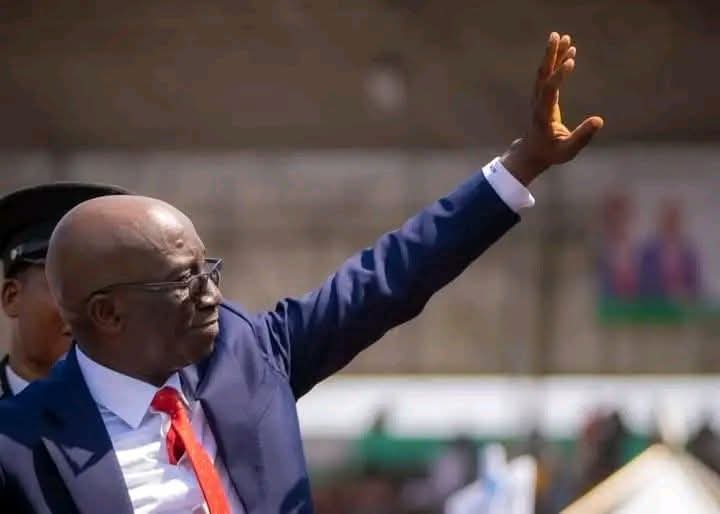
Governor Monday Okpebholo-led administration in Edo State, has posted an unprecedented ₦52.6 billion in Internally Generated Revenue (IGR) within just six months, a staggering 46% increase from the ₦36.1 billion recorded during the same period in 2024 under the administration of his predecessor, Godwin Obaseki.
This performance marks a watershed moment in Edo’s fiscal history, placing Okpebholo in the spotlight as a reform-minded leader, rewriting the state’s economic playbook with speed, precision, and results.
Otunba Oladele Bankole-Balogun, Executive Chairman of the Edo State Internal Revenue Service (EIRS), revealed that the half-year revenue figure reflects a remarkable 89.5% performance year-to-date, surpassing all mid-year benchmarks set in recent history.
“We are not just collecting revenue. We are restructuring the very foundations of Edo’s tax ecosystem. Our reforms are deliberate, people-focused, and technology-driven,” Bankole-Balogun said.
During Obaseki’s iron reign, critics often cited sluggish fiscal growth, over-reliance on projections, and a tax structure that struggled to expand the net.
In stark contrast, the Okpebholo-led government has moved from rhetoric to reality, turning tax revenue into a tangible driver of development across roads, healthcare, education, and digital infrastructure. The evidence lies not just in numbers but in execution.
“What Governor Okpebholo has achieved in just six months is more than a fiscal milestone; it is a statement that a New Edo is not just rising, it is already here,” said one policy analyst in Benin
Since assuming office in November, 2024, Okpebholo-led administration has focused on strengthening institutional capacity at the EIRS, launching a multifaceted approach that includes regular staff training and improved welfare, regular stakeholder engagements, infrastructure upgrade and strengthened compliance with tax laws
This holistic model of tax administration, rarely seen in state level governance, has led to the onboarding of 1,900 new taxpayers within the six-month window, marking a shift from theoretical tax expansion to operational reality.
“It’s a progressive model,” Bankole-Balogun said. “You don’t bring everyone into the tax net overnight. But you can focus on big-income earners, plug the leaks, and keep the momentum going.”
The EIRS Chairman emphasized that the Governor Okpebholo-led administration is not simply collecting tax but redefining public perception around civic responsibility.
“We are building a culture where taxation is not seen as a burden but a patriotic contribution. When people see their taxes being translated into development, compliance becomes easier.”
He assured that the revenue agency would intensify efforts to implement the new federal tax reforms recently signed into law by President Bola Ahmed Tinubu. This, he said, would further align state policy with national growth targets.
Edo’s IGR jump, places the state among the best-performing subnational governments in Nigeria’s fiscal landscape. Beyond the figures, the story is one of visionary leadership, robust governance and a laser-focused execution, that many argue was absent during the inglorious years of Obaseki’s tenure.
Under Okpebholo, the state’s tax-to-development correlation is now clearer than ever: roads are being built, healthcare centres are being revived, rural electrification is underway, and citizens are beginning to feel the presence of government in meaningful ways.
Edo residents across the three senatorial districts are expressing renewed confidence in Governor Okpebholo’s leadership. Traders, small business owners, and public servants cite visible improvements in infrastructure and government responsiveness as evidence that their taxes are no longer disappearing into bureaucratic black holes but are being reinvested into the community.
This renewed public trust is becoming a catalyst in itself, with voluntary tax compliance gradually rising. Economic watchers say this “fiscal trust dividend” is one of the most difficult but powerful achievements of any government, and Governor Okpebholo appears to have earned it in record time.
Moreover, Edo’s success story is beginning to send ripples across the South-South and beyond. Policy analysts suggest that the state is well on its way to becoming a benchmark for other state governments seeking to break free from dependence on federal allocations and embrace internal economic sovereignty.
As the numbers continue to roll in, it is becoming increasingly evident that Governor Monday Okpebholo is not just making history, he is reshaping Edo’s economic destiny. With bold fiscal strategies, unwavering political will, and a transparent governance style, the state is now viewed as a model for others to emulate.
“This is only the beginning,” Bankole-Balogun assured. “We are on a journey to build a self-sustaining Edo where revenue powers development, and development rewards taxpayers.”
With ₦52.6 billion in the bag in just half a year, and the entire machinery of state revenue gearing up for even higher performance, the fiscal renaissance in Edo is no longer a dream. It is a movement, and it is being led by Governor Monday Okpebholo.
By Fred Itua, The Chief Press Secretary to Governor Monday Okpebholo of Edo State.